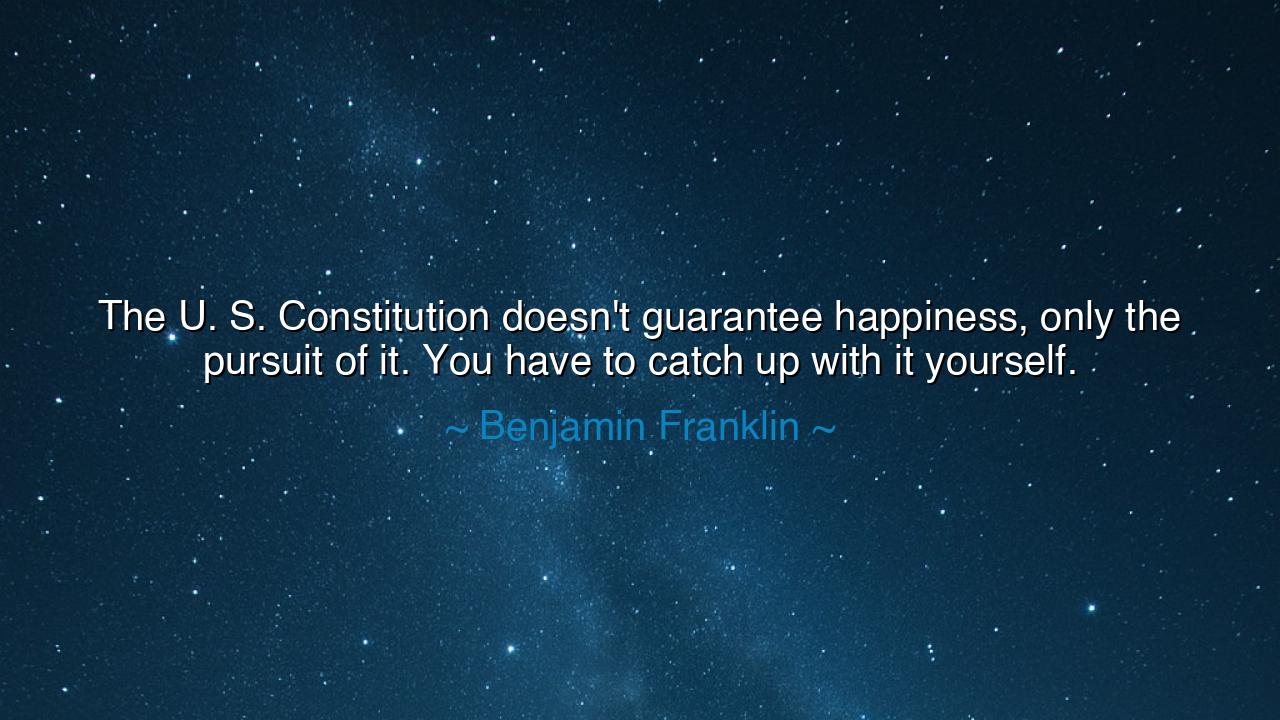
The U. S. Constitution doesn't guarantee happiness, only the
The U. S. Constitution doesn't guarantee happiness, only the pursuit of it. You have to catch up with it yourself.






Hear now the wise and timeless words attributed to Benjamin Franklin, one of the great architects of liberty and a philosopher of human endeavor: “The U.S. Constitution doesn’t guarantee happiness, only the pursuit of it. You have to catch up with it yourself.” Within this sentence lies a truth that transcends nations and ages — a truth about freedom, responsibility, and the eternal chase of the human spirit toward fulfillment. For Franklin, that elder of wisdom and wit, understood that happiness is not a right bestowed by law, nor a gift delivered by destiny, but a conquest of the heart, earned by one’s own striving.
This saying, though often quoted in modern times, carries its roots in the very soul of the American founding. The Declaration of Independence, penned by Thomas Jefferson and inspired by the philosophy of Enlightenment thinkers — among them Franklin himself — proclaimed that all men are endowed with the right to “life, liberty, and the pursuit of happiness.” But even then, the founders knew that government can only protect opportunity, not deliver joy. Franklin, ever practical and shrewd, reminded his countrymen that no parchment, no constitution, no decree of man could ever hand them happiness; they must pursue it — they must labor, learn, and live boldly until they make it their own.
Happiness, in Franklin’s mind, was never a state of indulgence or comfort. It was the byproduct of virtue, effort, and purpose. To him, the true pursuit of happiness was not idle pleasure, but the steady advancement of character — the satisfaction that comes when a man aligns his actions with his values, when his work serves both himself and the greater good. He saw happiness not as a treasure to be found, but as a flame to be kindled. “Energy and persistence,” he wrote elsewhere, “conquer all things.” And so he taught: happiness is not given — it is forged.
History offers us countless examples of those who lived by this creed. Consider the story of Helen Keller, who, though struck blind and deaf as a child, refused to surrender to despair. Through years of toil and tears, guided by her teacher Anne Sullivan, she pursued happiness with fierce determination. She learned to read, to write, to speak, and to inspire millions. No constitution granted her joy; she created it through will, gratitude, and courage. Her life stands as a testament to Franklin’s wisdom: that happiness must be caught — not wished for, not inherited, but seized with both hands by the brave and the patient.
And yet, how often do people forget this? They wait for joy as if it were owed to them. They demand happiness from the world — from governments, from lovers, from fortune — and grow bitter when it does not arrive. But Franklin would shake his head at such folly. He knew that liberty is only the doorway; it is up to the soul to step through. Freedom gives us the right to pursue our dreams, but only discipline, curiosity, and gratitude can transform that pursuit into fulfillment. To expect happiness without effort is like expecting harvest without seed — it is to wait forever in an empty field.
In this, Franklin’s humor cloaks a heroic lesson. The phrase “you have to catch up with it yourself” is both playful and profound. It tells us that happiness is swift — it moves with life itself. It will not linger for those who sit idle or dwell in regret. It must be pursued with energy, with attention, with joy in the chase. For to pursue happiness is not merely to seek pleasure, but to live fully, to engage in the world with open eyes and a willing heart. The pursuit itself — the striving, the learning, the loving — is what makes us alive.
So let this be your teaching, child of the ages: do not wait for happiness to come to you. Rise and follow it. Cultivate your mind, nurture your soul, labor with integrity, and give of yourself freely. The Constitution, or any law, can offer you freedom — but only your spirit can give that freedom meaning. Wherever you walk, bring purpose; whatever you build, build with love; whatever you seek, seek it with courage. For happiness, as Franklin knew, is not the prize at the end of the road — it is the road itself, made sacred by those who dare to travel it.
Thus, remember always the wisdom of the old sage: happiness is not a guarantee but a pursuit. It belongs not to those who wait, but to those who move; not to those who wish, but to those who work. Catch up with it yourself — and when you do, hold it gently, laugh with gratitude, and share it with others. For in that act, you will have fulfilled not only Franklin’s wisdom, but the deepest promise of liberty itself.






AAdministratorAdministrator
Welcome, honored guests. Please leave a comment, we will respond soon